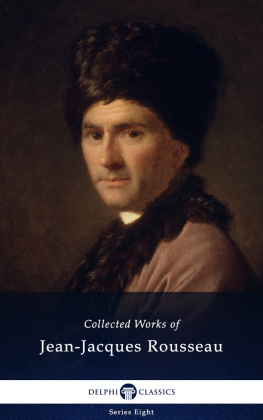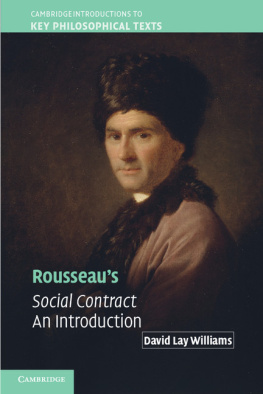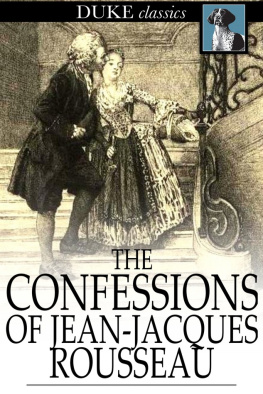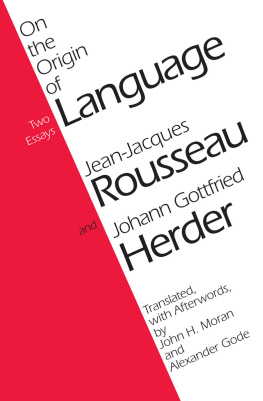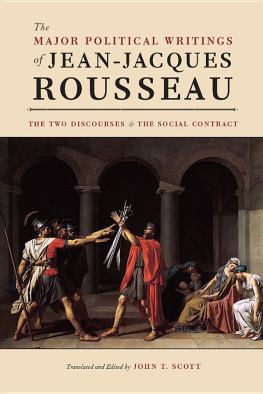Title page
Rousseau on Language and Writing: Two Perspectives
by Barry Stocker and John Bolender
with a foreword by Lance Kirby
Publisher Information
2014 digital version by Andrews UK Limited
www.andrewsuk.com
Published in 2014 by
ROUSSEAU, ETC.
Piketon, Ohio
www.rousseau-etc.com
Emotion in Language and Reply to Rousseau and Derrida on Liberty and on Language, the First Social Institution John Bolender
Rousseau and Derrida on Liberty and on Language, the First Social Institution and Reply to Emotion in Language Barry Stocker
Foreword Lance Kirby
Cover art: Blombos Ochre by Simon Max Bannister, used with permission: www.simonmaxbannister.com
Foreword, Lance Kirby
Jean-Jacques Rousseau has always been a richly divisive thinker, the contradictions of his life almost displaying a split-personality. It is therefore fitting that this duality is mirrored by the essays gathered in this volume upon one of Rousseaus lesser known works, the Essay on the Origin of Languages . Here Rousseau sought to argue, making wild and brilliant philological and sociological speculation along the way, that originally language developed in warm southern climes where it held a musical and emotional character that, with its migration to the north, would become more coldly rational and utilitarian. If we agree with this hypothesis, it may go a long way in explaining the decline of poetry from its period of greatest flowering in the antiquity of Greece, to its diminishment to the humble lyric of today. For Rousseau, ours is an age for the cold businessmans prose of the account books not for the singing of epics.
It would be no stretch to claim that all of Rousseaus work is one sustained attack upon inauthenticity in human relations. In this, the Essay on the Origin of Languages is just one small continuation of that project. We all wear masks, and language is just one more mask we wear to hide our true selves from one another. In the linguistic turn of twentieth century philosophy and the rise of the Analytic/Continental divide, Rousseau was thus in a way prescient in reminding us that too often language can be as much a shield of self-protection as it is a means of conveying ideas. In a manner similar to C. P. Snows Two Cultures, it becomes merely a tool of defense, where both parties talk past one another instead of genuinely engaging, as the recent commotion between Noam Chomsky and Slavoj iek might suggest. In this, Professors Barry Stocker and John Bolender have rendered a service in helping to spur just such a dialogue. Bolender, writing from the Analytic perspective, and Stocker from the Continental, have produced essays from their respective domains, each in turn then has contributed a separate essay upon these two original interpretations.
Barry Stocker gives us an absorbing study pairing Rousseau with Jacques Derrida, exploring a deconstructed investigation of the Essay . With a subtle and nuanced analysis Stocker explains that, due to the indeterminacy of language that a flawless definition of concepts such a liberty and community can never be achieved but that political language must remain in constant discussion with its self. John Bolender asks how does emotion in language create solidarity in a community and, further, challenges the Chomskian view against oratory as a positive and perhaps necessary force for political cohesion, speculative insights that present an excellent example of philosophys ability to offer new lines of scientific research and inquiry.
The book as a whole is a wonderful demonstration of the limitless possibilities that a great philosopher can elicit even two-hundred years after his death, and the still greater possibilities for cross fertilization and experimentation across the, perhaps, artificial gap of the so called Analytic/Continental divide. Regardless, if this volume does not achieve its hoped for aim and ignite similar attempts at such dialogue, it remains a unique and stimulating exchange upon a much under-appreciated work by one of the greatest thinkers of the Enlightenment.
Emotion in Language, John Bolender
If you do not feel a thing, you will never guess its meaning.
Emma Goldman, quoted in Ferguson (2011, 198)
Jean-Jacques Rousseaus Essay on the Origin of Languages anticipates some very recent developments in linguistics, while also suggesting means of further developing linguistic research. The value of the Essay today lies largely in the fact that these means of development may not be immediately obvious to us without Rousseaus help. These potential benefits to cognitive science are not limited to linguistics. The Essay suggests a means for linking the study of language with the study of social cognition, specifically in Rousseaus attempts to link language with politics. The potential benefit to philosophy of language is also significant. Rousseaus emphases are radically different than the emphases of todays recent philosophy of language. However, despite the differences in emphasis, a strong commitment to naturalism unites Rousseau with many of todays philosophers including philosophers of language. (Stephen Neales numerous references to generative grammar (1990), for example, show that he aims to be doing philosophy of language in a scientifically informed manner.) Perhaps this common ground will suffice for them to begin to consider Rousseaus Essay seriously, as a source of questions and proto-hypotheses. In doing so, they will find themselves breaking into some possibly surprising new territory.
Modern philosophy of language owes its origins largely to the work of Gottlob Frege whose main concern was semantics. As a result, philosophy of language today is also largely concerned with semantics, only addressing issues of form and structure insofar as they directly relate to semantics. An exception would be Jerrold Katz who was concerned with the ontological status of syntactic structures (1996), but even Katz was at one with most philosophers of language in having virtually no interest in phonetics or emotional content. If todays philosophy of language had owed its origins to Rousseau, rather than Frege, the focus of research would be very different indeed. Rousseaus focus was on the sound of language and how sound relates to emotion. Even when Rousseau discusses meaning, such as in his treatment of figurative language, the emphasis is still on emotion, namely how emotional forces lay behind metaphorical uses of language.
Of course, in some sense the emotional content of language, or that component of language which evokes feeling, is a kind of meaning. Even Frege appreciated this, as shown in his discussing a sort of meaning which
is often said to act on the feelings, the mood of the hearer or to arouse his imagination. Words like alas and thank God belong here. Such constituents of sentences are more noticeably prominent in poetry, but are seldom wholly absent from prose. They occur more rarely in mathematical, physical, or chemical than in historical expositions. What are called the humanities are more closely connected with poetry and are therefore less scientific than the exact sciences which are drier the more exact they are, for exact science is directed toward truth and only the truth [T]he constituents of language, to which I want to call attention here, make the translation of poetry very difficult, even make a complete translation impossible, for it is in precisely that in which poetic value consists that languages differ most. (1956, 295; see also Frege 1997, 23940)
Rousseau was largely concerned with meaning, but this is an affective meaning, a kind of meaning at least partly transmitted through the more musical elements of language, especially rhythm and inflection. It would not enter into truth conditions, and hence would play no role in meaning as conceived by Davidson. While most philosophers of language, in the last 130 years or so, are concerned with the sort of meaning which survives translation, Rousseau was also interested in the sort of meaning which is often extinguished by it. There is potential here for linking the psychological study of emotion with the study of language, a cross-disciplinary field which should be of philosophical interest due to its political dimension, as will be discussed more fully at a later point. The connection with politics was anticipated by Rousseau.
Next page

